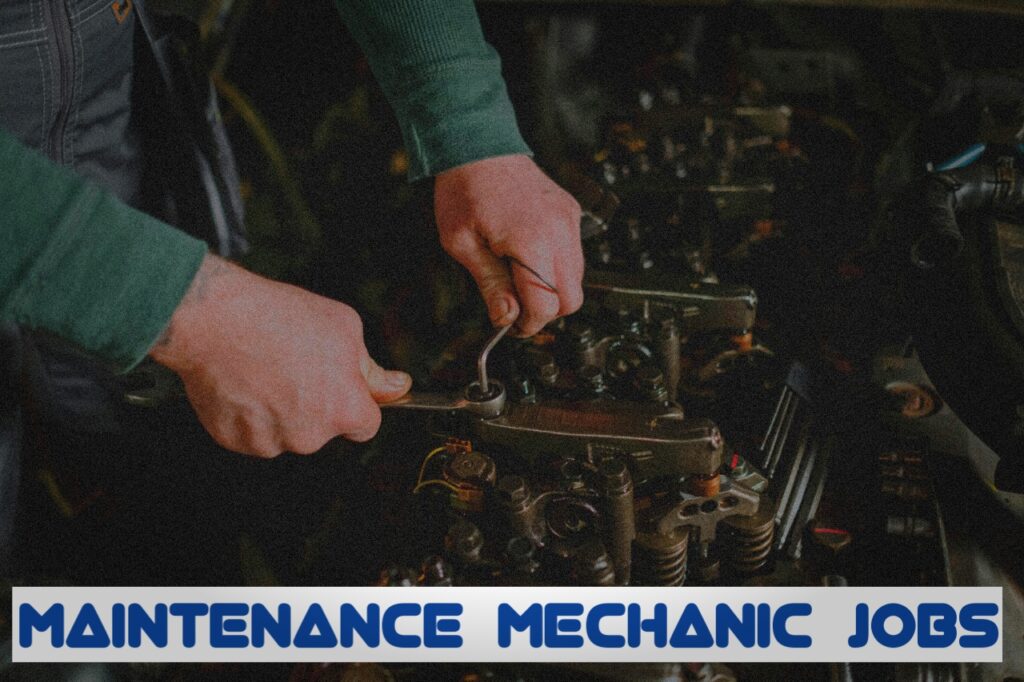Maintenance mechanic jobs are essential for keeping industrial equipment and facilities operational. As a maintenance mechanic, you’ll inspect, troubleshoot, and repair machinery to minimize downtime and support smooth production in industries like manufacturing, automotive, and utilities.
This role is in high demand, and with the right skills and experience, you can secure a stable and rewarding career.
In this article, we’ll break down the duties of a maintenance mechanic, salary expectations, key differences between maintenance mechanics and technicians, training requirements, and where you can find job opportunities.
If you enjoy working with your hands and solving problems, a career in maintenance mechanics might be a good fit for you.
What is a Maintenance Mechanic?
A maintenance mechanic is a skilled professional who performs repairs and preventive maintenance on mechanical systems and machinery.
This job involves understanding and working with motors, gears, belts, pulleys, and other machine components. Maintenance mechanics keep operations efficient by addressing mechanical issues quickly, often with limited downtime for repairs.
Maintenance mechanics work in many fields, such as manufacturing, utilities, construction, and automotive. While job specifics vary by industry, the goal remains the same: ensure equipment and machinery function smoothly and safely.
What Does a Maintenance Mechanic Do?
Maintenance mechanics perform a range of tasks aimed at keeping machinery and equipment operational.
Common duties include:
- Inspecting machinery: Checking for signs of wear, leaks, or damage in machinery.
- Diagnosing issues: Troubleshooting mechanical problems and identifying the cause of equipment malfunctions.
- Repairing components: Replacing or fixing damaged parts, including belts, bearings, gears, and electrical components.
- Performing preventive maintenance: Conducting regular maintenance, such as lubricating moving parts, adjusting settings, and replacing filters, to reduce wear and prevent breakdowns.
- Testing equipment: After repairs, testing machinery to confirm that it operates correctly and meets safety standards.
How Much Does a Maintenance Mechanic Make?
Salaries for maintenance mechanics vary based on industry, experience, and location. Here’s a general breakdown:
- Entry-Level: $35,000 – $45,000 per year.
- Mid-Level (3–5 years): $45,000 – $55,000 per year.
- Experienced Mechanics (5+ years): $55,000 – $70,000 or more.
- Specialized or Senior Mechanics: Up to $80,000 or more annually.
In addition to base pay, some companies offer overtime, bonuses, and shift differentials, which can increase earnings.
What is the Difference Between a Maintenance Mechanic and a Maintenance Technician?
Though similar, maintenance mechanics and maintenance technicians have different responsibilities:
- Maintenance Mechanic: Focuses primarily on mechanical repairs and upkeep of machinery and equipment. Mechanics work directly with mechanical parts, motors, and tools.
- Maintenance Technician: Often handles a broader range of systems, including mechanical, electrical, plumbing, and HVAC, especially in facilities management roles. Technicians may have specialized training across multiple trades.
Mechanics are more specialized in mechanical work, while technicians often take on broader responsibilities involving different building systems.
What is the Job Description of a Maintenance Mechanic in Manufacturing?
In manufacturing, maintenance mechanics play a vital role in minimizing downtime and ensuring continuous production.
Here’s a look at their duties in this setting:
- Monitor and inspect machinery: Conduct routine inspections on machinery to catch issues early.
- Respond to malfunctions: Diagnose and repair equipment when it fails, often under time constraints to minimize disruptions.
- Perform preventive maintenance: Follow maintenance schedules to replace worn parts and lubricate moving components.
- Collaborate with production staff: Work closely with operators and supervisors to understand machinery performance and address recurring issues.
- Record-keeping: Log maintenance and repair work, which helps track equipment performance over time.
In manufacturing, mechanics are essential to smooth operations and equipment reliability.

How Long Does It Take to Complete Training to Become a Maintenance Mechanic?
Training to become a maintenance mechanic can take anywhere from six months to two years, depending on the route you choose:
- Vocational School or Trade School: Many programs take one to two years and cover essential skills in mechanical repair, troubleshooting, and safety.
- Apprenticeships: Some mechanics enter the field through apprenticeships, which combine on-the-job training with classroom education. These programs generally last two to three years.
- Certifications: Certifications like the Certified Maintenance & Reliability Technician (CMRT) can boost your credentials and job prospects. Preparing for certification can take a few months, depending on prior knowledge.
Required Expertise and Qualities
To succeed as a maintenance mechanic, you’ll need specific skills and personal qualities:
Key Responsibilities
- Inspect Equipment: Regularly inspect machinery and equipment for wear, damage, and proper functioning. Identify issues that could lead to malfunctions.
- Diagnose Problems: Troubleshoot mechanical failures to determine the root cause of issues and recommend or execute repairs.
- Repair and Replace Parts: Fix or replace faulty components, including motors, belts, gears, bearings, and valves, using hand tools and power tools.
- Perform Preventive Maintenance: Follow maintenance schedules, including lubrication, cleaning, adjustments, and replacements, to prevent breakdowns.
- Test Equipment: After repairs or maintenance, test machinery to ensure it’s working correctly and meets safety and operational standards.
- Record Maintenance Activities: Document work performed, including repairs, replacements, and scheduled maintenance, to track machinery history.
- Collaborate with Other Teams: Coordinate with production staff, engineers, and supervisors to address maintenance needs and schedule downtime for repairs.
- Comply with Safety Standards: Follow safety protocols, wear protective gear, and use safety measures to ensure a safe work environment.
Qualifications and Skills
- High School Diploma or GED: Basic educational requirement; vocational or technical training is often preferred.
- Mechanical Knowledge: Strong understanding of mechanical systems, including gears, motors, belts, hydraulics, and pneumatics.
- Troubleshooting Skills: Ability to quickly diagnose problems and devise effective solutions.
- Physical Stamina: Comfortable with physical tasks, including lifting, bending, and working in confined spaces.
- Attention to Detail: Carefully monitor machinery to identify issues and prevent potential malfunctions.
- Basic Electrical Knowledge: Understanding of basic electrical circuits is often a plus, especially for machinery with electronic controls.
- Experience: Prior experience in maintenance or a related field is often required, especially in more specialized or senior roles.
Benefits of Working as a Maintenance Mechanic in Some Companies
Many companies offer benefits beyond salary to attract and retain skilled maintenance mechanics.
Here are some perks you might find:
- Healthcare and dental insurance
- Retirement plans (401k or pension)
- Paid vacation and sick leave
- Opportunities for overtime pay
- and development programs
- Tool allowances or reimbursement
The specific benefits depend on the employer, but many companies recognize the importance of skilled maintenance mechanics and offer competitive packages.
Which Countries Are Best for a Maintenance Mechanic Job?
If you’re considering work abroad, here are some top countries for maintenance mechanics:
- United States: High demand in manufacturing, automotive, and aerospace industries.
- Germany: Strong engineering and manufacturing sectors.
- Canada: Many opportunities in mining, manufacturing, and public utilities.
- Australia: Growing demand in mining, construction, and energy sectors.
- United Kingdom: Demand for maintenance mechanics in manufacturing and construction.
These countries offer opportunities across a range of industries, often with competitive pay and benefits.
Where to Find Maintenance Mechanic Job Opportunities
Finding a maintenance mechanic job is easier with the right resources.
Here are some places to start:
- Online job boards: Websites like Indeed, Glassdoor, and LinkedIn offer a wide selection of maintenance mechanic roles.
- Company websites: Many companies post job openings on their websites under “Careers.”
- Trade associations: Organizations like the National Institute for Automotive Service Excellence (ASE) may list industry-specific job openings.
- Apprenticeship programs: Trade schools and vocational programs often have connections with local employers.
- Staffing agencies: Specialized staffing agencies may help match you with employers seeking maintenance mechanics.
- Networking with industry professionals and joining trade groups can also be helpful for finding job openings.
- Below
Conclusion
Maintenance mechanic jobs offer a stable career with opportunities for growth, competitive pay, and job security. By gaining the right skills and experience, you can work in industries like manufacturing, automotive, and utilities worldwide.
With a focus on hands-on repair and preventive maintenance, maintenance mechanics keep essential machinery running and play a critical role in various industries. If you’re interested in a practical, in-demand career, maintenance mechanics might be a great fit for you.
As an Amazon Service LLC Program Associate, V. Auto Basics earns from qualifying purchases. See Our Affiliate disclaimer.
